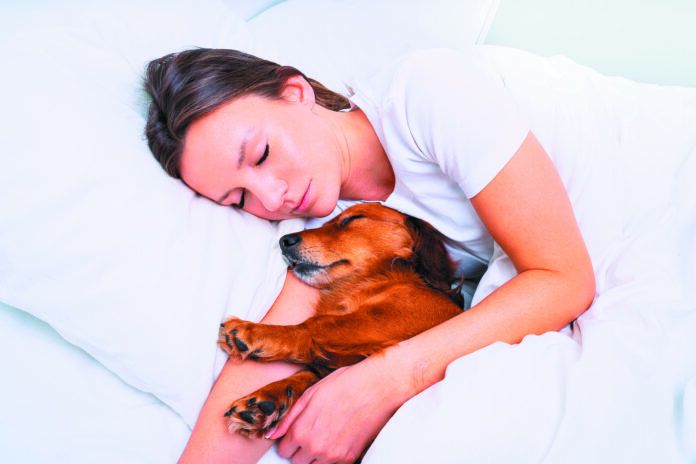Science would tell you that having a dog in the bed with you will interfere with a solid night’s sleep. Research on two dozen dogs showed that our canine friends wake up 23 times during an 8-hour sleep cycle — and stay awake for 5 minutes each time, sometimes barking! People, on the other hand, naturally wake up only about six times each night (even if they don’t remember it), and frequently less often.
Yet many people would tell science to go take a hike. They maintain that sleeping with their dog makes their slumber sounder. Why the discrepancy?
To Sleep, Perchance to Cuddle
Especially if a person feels anxious or depressed, having a warm canine body to snuggle up against in bed may feel just right. The good feelings and sense of calm that come from the closeness may outweigh the disruptions that can be caused by a dog’s natural biorhythms. Indeed, when researchers at the Mayo Clinic measured the sleep of 40 people who slept with their dogs (by fitting them with accelerometers, which measure movement), it turned out they had a not unreasonable 81 percent sleep efficiency. (The dogs were fitted with accelerometers, too, and had 85 percent sleep efficiency, in case anyone’s interested.) Specifically, the people spent an average of 7.9 hours in bed and slept for 6.7 of them, which the researchers call “good sleep efficiency.” They did sleep more when their dog was off the bed, but for some people, the tradeoff of a little extra sleep for a little extra closeness is worth it.
Who should not let their dog on the bed?
Despite the fact that surveys suggest more than half of Americans sleep with their dogs on the bed, there are a couple of groups of people who would do well to seriously consider keeping their dogs off the mattress:
- Anyone who has a diagnosed sleeping disorder, such as sleep apnea or insomnia. If you already have difficulty sleeping because of a medical condition, adding a fidgety animal into the mix may only make getting a sound night’s sleep that much more difficult.
- Anyone with breathing problems. These could include conditions ranging from an allergy to the dog to asthma or COPD (chronic obstructive pulmonary disease). Difficulty breathing can make restful sleep a challenge on its own. A dog, especially if he’s restless, only stands to compound the problem.
Note: If you have been sleeping with your dog and decide to end the habit, it’s best to do it cold turkey rather than gradually. That might seem cruel to the dog, but they don’t get “sometimes.” You can soften the blow by putting a cozy dog bed in your room and giving your pet a nice treat just before it’s lights out.





